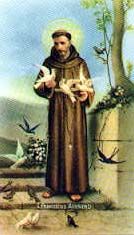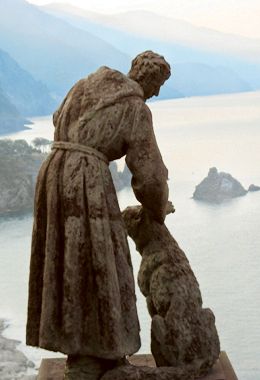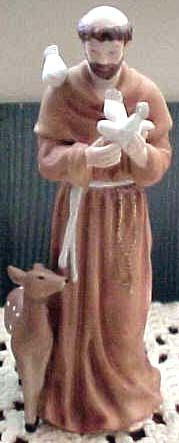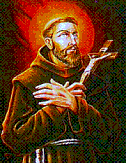Lord, make me an instrument of your peace.
Where there is hatred, let me sow love;
where there is injury, pardon;
where there is doubt, faith;
where there is despair, hope;
where there is darkness, light;
and where there is sadness, joy.
O Divine Master, grant that I may not so much seek
to be consoled as to console;
to be understood as to understand;
to be loved as to love.
For it is in giving that we receive;
it is in pardoning that we are pardoned;
and it is in dying that we are born to eternal life. Amen
Today, October 4, we celebrate the feast of Saint Francis of Assisi (1181-1226), Founder of the Franciscan Order, “little beggar of Assisi,” and possibly the “most famous Saint” in history. Saint Francis’ simple devotion to the Lord, love of all creatures, deep faith, and life of service to his fellow man have inspired countless Christians to embrace the virtues of the Cross. The poverty and humility of Saint Francis reflected the image of Christ to all he encountered, and continue to do so today as we reflect on the life of this holy man.
Francis was born in Assisi, Italy, and given the name John at his baptism. His father, a wealthy merchant, however later renamed him “Francesco” out of love for France. Francis grew up with the time and money available only to the rich, brawling in the streets and hosting lavish banquets for nobility, earning a reputation as the “king of feasts.” Both handsome and charming, he excelled socially and academically, and soon took after his father in becoming a proficient merchant of cloth. Despite his apparent success, he dreamed of the adventurous life of chivalry available to knights in service to the King, and joined the army at the age of 20.
Francis was soon wounded and taken prisoner, where he languished in a damp dungeon and contracted malaria. His father was all to happy to pay the ransom for his release, and Francis returned to Assisi a changed man. Quieter, less prone to partying, he was reflective and contemplative—spending most of his time in bed (he was, after all, still ill with fever), and feeling the call of the Lord to a ministry of peace and justice.
One night, following his father’s death (and a resulting depression which exacerbated his malaria) a mysterious voice asked him while he was lying in bed: "Who do you think can best reward you, the Master or the servant?"
Francis answered, "The Master."
The voice continued, "Why do you leave the Master for the servant?"
Francis realized the servant was the royalty of the world which he aspired to serve. He was miraculously converted, changing his life, convinced that God had spoken to him. From that moment on, Francis began to care for the sick and the poor -- especially the lepers -- convinced that this was what God had called him to do.
He again was the recipient of divine communication when in 1205, during prayer in the abandoned Church of San Damiano, Francis heard a voice coming from the crucifix which challenged him to rebuild the church: “Francis, go out and build up my house, for it is nearly falling down.”
At first he thought it meant that he should rebuild San Damiano, so he sold some of his father's cloth to raise money to build the Church at San Damiano. His father, who was already upset about the life he was leading, took him to court, where he was ordered to pay back the money. Francis complied with a dramatic gesture, renouncing his inheritance and handing his expensive clothing to him as well. Dressed only in a workman's smock, he left town and spent the next two years as a hermit, taking a vow of poverty and dedicating his life his life to God. He took the Gospels as the rule of his life, Jesus Christ as his literal example. He dressed in rough clothes, begged for his sustenance, and preached purity and peace. He visited hospitals, served the sick, preached in the streets, and took all men and women as siblings.
As Francis begged for his food, wore old clothes, and preached peace throughout the streets of Italy, he began to attract attention, and later followers. Inspired by Jesus having said, “Leave and follow me,” Francis founded the Friars Minor (Franciscan) Order in 1209, having secured papal blessing. Several years later, in 1212, he founded the f the Order of "Poor Clares," with Saint Clare of Assisi who had become his spiritual student. He also founded the "Third Order of Penance" which included lay people. Members of the Order traveled throughout central Italy and beyond, preaching for people to turn from the world to Christ. In his life and preaching, Francis emphasized simplicity and poverty, relying on God's providence rather than worldly goods. The brothers worked or begged for what they needed to live, and any surplus was given to the poor. Out of humility, he refused the priesthood when offered by the pope.
Saint Francis directed his newly founded orders until 1221, when he resigned direction to continue his work. He composed songs and hymns, finding the glory and perfection of the Lord surrounding him in nature. He lived and communed with animals, cared for the sick (especially lepers), sent food to thieves, and embraced all of God’s creatures as sacred. Not afraid or proud, he engaged in the most humble of tasks, cleaning churches and caring for those in need.
One of Saint Francis’ most famous sermons is reported to have been delivered to birds, who paused in their flight and landed to hear his words. Legend tells us that Saint Francis said:
“My little sisters the birds, much do you receive from God your Creator, and always and in every place you ought to praise Him. He has given you freedom to go into every place, and also did preserve your seed in Noah’s ark, so that your kind might not perish from the earth. Again, you receive from Him the element of air which He has made for you.
God feeds you and gives you the rivers and the fountains to drink from; He gives you the mountains and the valleys for your refuge, and the tall trees wherein to build your nests.
And as you can neither spin nor sew, God clothes you, you and your children.
Your Creator loves you much, since He has given you so many marvelous gifts. So beware, little sisters of mine, of the sin of ingratitude, but ever strive to praise God.”
Living as a hermit on Mount Alvernia in the Apennines, Saint Francis received the stigmata while deep in meditation on the Passion of Christ in September 1224. His wounds (the five wounds suffered by Christ) periodically bled during the remaining two years of his life. He is the first recorded person in history to receive the stigmata. Given his wounds, his final years were filled with suffering as well as humiliation. Years of wandering had left him crippled and nearly blind. Saint Francis died at the age of 44 in 1226 at Portiuncula, Italy. He was canonized by Pope Gregory IX less than two years later.
Although Saint Francis had asked to be buried in the criminals' cemetery in the Colle d'Inferno, a crowd of his fellow citizens came down and bore his body to the church of Saint George in Assisi. Two years later, in 1228, the first stone was laid for the beautiful basilica built in Francis' honor. In 1230 his body was translated to the basilica in Assisi, where it remains today.
Saint Francis called for simplicity of life, poverty, and humility before God. In all his actions, Francis sought to follow fully and literally the way of life demonstrated by Christ in the Gospels. His respect and appreciation for creation was so profound because it always led him to the Creator. For Francis, the Eucharist became the deepest source of support for his desire for cosmic peace and reconciliation. Just two years before he died, Saint Francis said: "I beseech all of you, by whatever charity I can, that you show reverence and all honor to the most Holy Body and Blood of our Lord Jesus Christ, because (in Him) all things, whether on earth or in heaven have been pacified and reconciled with Almighty God."
Father,
you helped Saint Francis to reflect the image of Christ
through a life of poverty and humility.
May we follow your Son
by walking in the footsteps of Francis of Assisi,
and by imitating his joyful love.
Grant this through our Lord Jesus Christ, your Son,
who lives and reigns with you and the Holy Spirit,
one God, for ever and ever. Amen.
Day 277 of 365
Prayer Intentions: Love, Humility, Charity, Faith, Peace.
Requested Intentions: Successful outcome of court case and employment (L); For guidance and righteous love (K); Restoration of a relationship (H); For successful employment (I); For a daughter’s successful relationship (M); For a relationship sanctified by God (M); For health of father; For canonization of Pope John Paul II (A); For the conversion of a family (L); For the ill (A); For the health of a family (I); For a father’s successful surgery and recovery (G); For those who are ill, and their caretakers (D); For the safety of a sister who is traveling (A); Recovery of mother with cancer (R); Successful acquisition of a visa (T); Restoration of a marriage (A); For employment and health of mother (G); Successful employment (M); Restoration of a family, End to brother's addiction, Successful marriage (R); Employment (I); Successful recovery of a mother; for all stroke victims (D); Successful return to the faith (A); Emotional, physical, and financial healing (D); Diagnosis and recovery (A); For a successful relationship (J); Those suffering from depression (J); Successful adoption (S); Healing of a father battling cancer (S).
Why pray the Rosary every day for a year?
Each time the Blessed Virgin has appeared-- whether it be to Saint Bernadette Soubirous at Lourdes; to Lucia, Jacinta, and Francisco at Fatima; or to Mariette Beco at Banneux-- she has asserted the importance, saving grace, and power of praying the Holy Rosary on a daily basis. Based upon her words, the Rosary is penance and conversion for sinners, a pathway to peace, an end to war, and a powerful act of faith in Jesus Christ. Pope Paul VI presented the Rosary as a powerful means to reach Christ "not merely with Mary but indeed, insofar as this is possible to us, in the same way as Mary, who is certainly the one who thought about Him more than anyone else has ever done."
To show us how this is done, perhaps no one has been more eloquent than the great Cardinal Newman, who wrote: "The great power of the Rosary consists in the fact that it translates the Creed into Prayer. Of course, the Creed is already in a certain sense a prayer and a great act of homage towards God, but the Rosary brings us to meditate again on the great truth of His life and death, and brings this truth close to our hearts. Even Christians, although they know God, usually fear rather than love Him. The strength of the Rosary lies in the particular manner in which it considers these mysteries, since all our thinking about Christ is intertwined with the thought of His Mother, in the relations between Mother and Son; the Holy Family is presented to us, the home in which God lived His infinite love."
As Mary said at Fatima, "Jesus wants to use you to make Me known and loved. He wishes to establish the devotion to My Immaculate Heart throughout the world. I promise salvation to whoever embraces it; these souls will be dear to God, like flowers put by Me to adorn his throne."

Subscribe to:
Post Comments (Atom)





















0 comments:
Post a Comment
Thanks for leaving a comment. If you wish to submit a prayer request, however, please do so above, using the "Contact" tab.